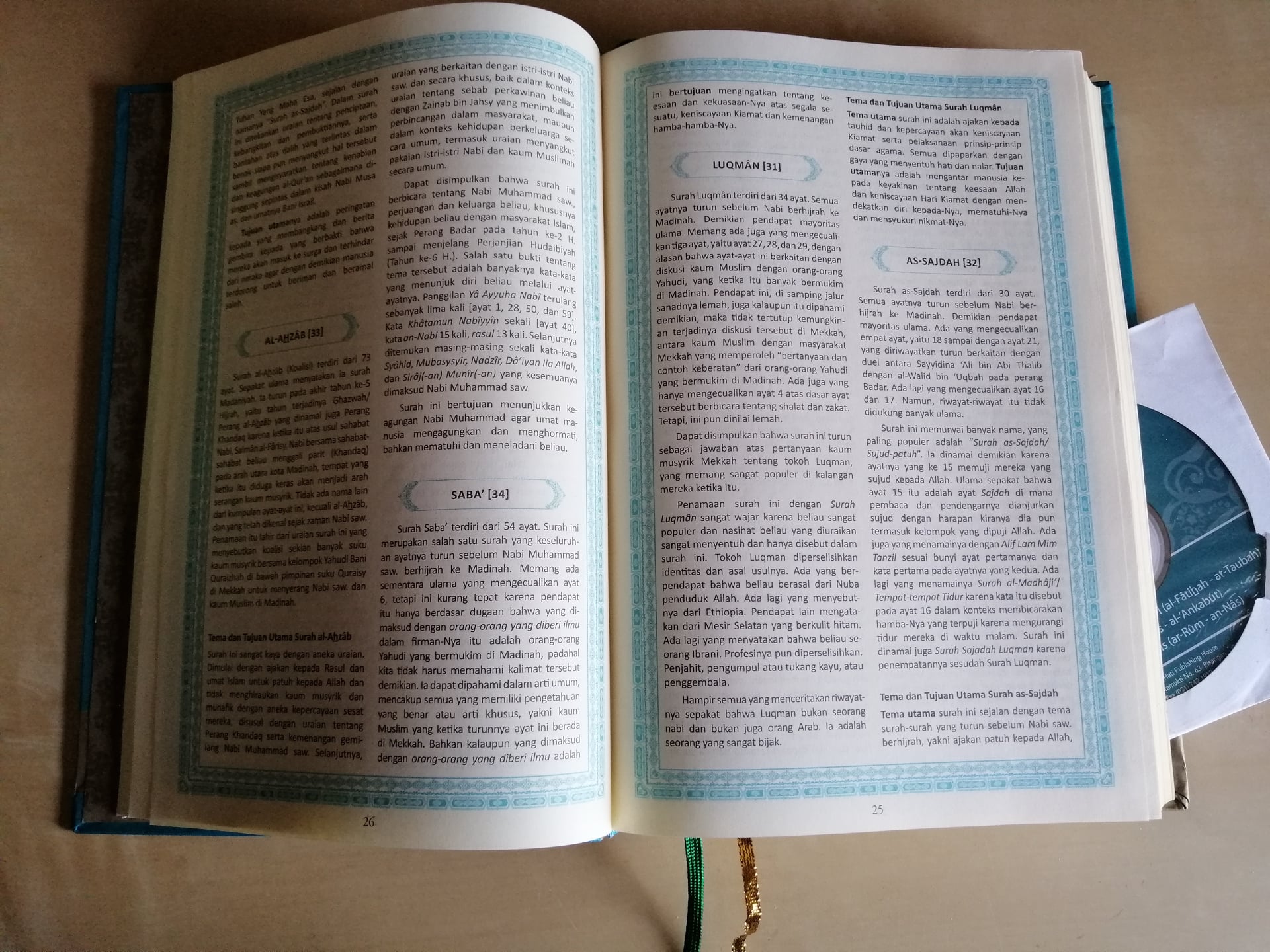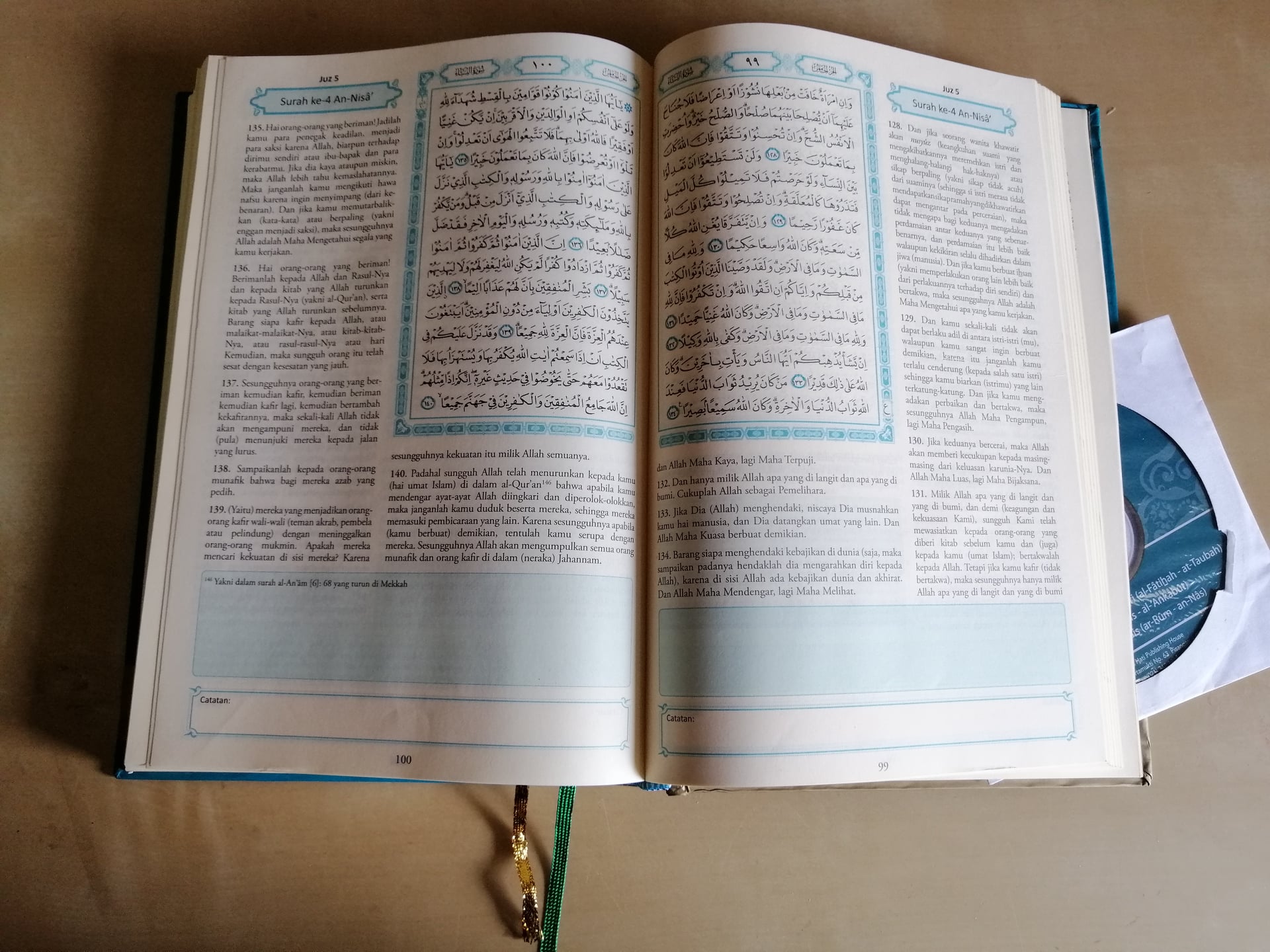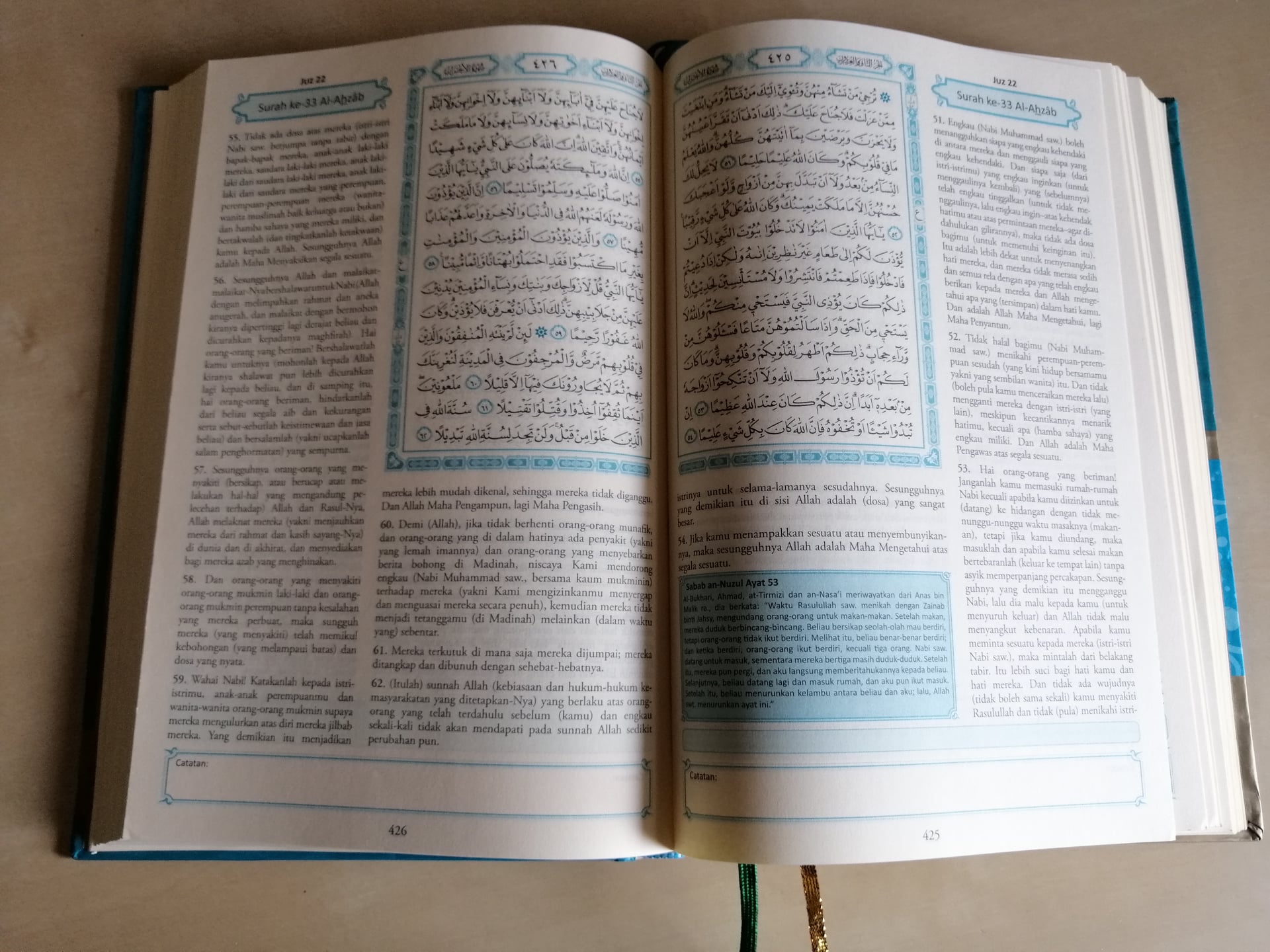“This work”, says the publisher, Lentera Hati, “was not named ‘The Qur’an and its Translation’, because its author, M. Quraish Shihab, was acutely aware that the Qur’an is a holy book that cannot possibly be translated into any other language. All that the exegetes can do is to reveal the meaning, not translate it!”
Despite these reservations, Muhammad Quraish Shihab’s “Al-Qur’an dan Maknanya” (“The Qur’an and its Meanings”, first published in 2010) comes across as a Qur’an translation, rather than a qur’anic commentary. Published in a single 650-page volume, which includes both the Arabic text of the Qur’an and an appendix that summarizes the content of all surahs, the work renders the meaning of the Qur’an into Indonesian verse by verse. Some footnotes contain additional explanations, and the occasion of revelation of a segment of the Qur’an is infrequently provided, but the proportion of such additional material is small.
Readers who are looking for an actual qur’anic commentary will find other works by the same author more useful, for Muhammad Quraish Shihab (b. 1944) is a prolific Indonesian exegete, and a highly visible one as well, as he was the country’s first TV exegete. Inspired by the Egyptian sheikh Muhammad al-Mutawalli al-Sha’rawi, in 2004 he began hosting TV programmes that focused exclusively on the interpretation of the Qur’an. In marked contrast to the often emotional performances of popular preachers, he presented himself as a traditional scholar whose calm and reasoned discourse is embedded in the Sunni exegetical heritage. While his ties to the late dictator Suharto, under whom he served as Minister of Religious Affairs, have caused some controversy, his authority as a religious scholar is bolstered by his Hadhrami decent and his PhD degree from al-Azhar University in Egypt, an institution which holds high prestige in Indonesia. (On Quraish Shihab, his biography and his exegesis, see Munir Ikhwan’s doctoral dissertation: https://refubium.fu-berlin.de/handle/fub188/8572).
Quraish Shihab draws heavily on that prestige in his “Al-Qur’an & Maknanya”, too. In the introduction, despite his scepticism of Qur’an translations, he cites a fatwa from al-Azhar on the permissibility of translating the Qur’an and the conditions of such translations, and he mentions al-Azhar’s concise qur’anic commentary “al-Muntakhab” as his main source (see https://gloqur.de/quran-translation-of-the-week-26-al-montakhab/). He goes on to say that he aims to avoid the pitfalls of a “literal translation” and will instead give the complete meaning of verses, even if that means adding explanations that the source text does not contain. By explicitly taking this stance, he positions himself in the debate over the correct method of translating the Qur’an that is going strong in Indonesia, not least because this debate often implicitly or explicitly involves criticism of the government translation (for a case study, see https://gloqur.de/quran-translation-of-the-week-17-muhammad-thalibs-tarjamah-tafsiriyah-an-islamist-counter-translation/). Called “The Qur’an and its Translation” (“Al-Qur’an dan terjemahnya”), the translation produced and published by the Indonesian Ministry of Religious Affairs dominates the Indonesian market (see https://gloqur.de/quran-translation-of-the-week-01-al-quran-dan-terjemahnya/) and targets the same readership that Quraish Shihab presumably wants to reach.
Quraish Shihab carefully avoids any explicit mention of “Al-Qur’an dan terjemahnya”. However, he does, in fact, draw on it quite heavily, to the extent that his work often appears to be a revised version of the government translation, but with some significant changes, additions, and occasionally deletions.
For example, Q 5:51, one of the most contested qur’anic verses in today’s Indonesia, instructs the believers, “Do not take the Jews and Christians as awliyāʾ”. While the Ministry of Religious Affairs has translated the term “awliyāʾ”, the plural of the Arabic noun “walī”, as “leaders” (“pemimpin-pemimpin”) in older editions and “loyal friends” (“teman setia”) in more recent ones, Quraish Shihab has “wali-wali (teman dekat dan penolong)”, meaning “walis (close friends and helpers)”. This illustrates two features that are typical of his work: first, he prefers to use an Arabic term with an explanation to providing a single translated meaning and, secondly, he strives to do justice to the multiplicity of possible meanings by mentioning two or more common interpretations. If possible, he tries to harmonize between them as he does in this case, where “awliyāʾ” are “close friends AND helpers” rather than “close friends OR helpers”.
In his rendition of another contested verse, Q 4:34, he adds substantial exegetical content to mitigate the impact of a translation that in its literal meaning gives a husband permission to beat his wife. While the Ministry of Religious Affairs laconically translates the relevant segment as “dan (kalau perlu) pukullah mereka”, meaning “and (if necessary) beat them”, Quraish Shihab has “dan (jika itu belum membuatnya jera) pukullah mereka (dengan cara yang tidak menyakitkan)”, meaning “and (if the previous measures have not acted as a deterrent), beat them (in a manner that does not hurt them)”.
He is much less interested in giving explanations on verses that involve theological problems, such as Q 20:5 which describes God as “establishing himself on” or “rising over” (istawā) His Throne, which elicits debates about anthropomorphism. His primary concern lies clearly with the ethics of contemporary society. However, Quraish Shihab emphasizes the importance of Arabic philology. This sometimes results in a long-winded, cumbersome style. For example, the first segment of Q 22:18 (“a-lam tara anna llāha yasjudu lahu man fī l-samawāt wa-man fī l-arḍ …”) is translated by the Ministry of Religion in simple and comprehensible Indonesian as “Do you not know that everyone who is in the heavens and everyone who is on earth bows down to God …” (“Tidakkah engkau tahu bahwa siapa yang ada di langit dan siapa yang ada di bumi bersujud kepada Allah …”). Quraish Shihab, unhappy with this translation for several reasons, translates it along the following lines: “Are you not aware that God, to Him bows down (is submissive and obedient) everyone (and everything) that is in the Heavens, and everyone (and everything) that is on earth …” He does not trust readers to recognize the metaphorical meaning of “bersujud” (“bowing down”, “kneeling”, “falling prostrate”) without him spelling it out for them, nor does he dare deviate from the Arabic syntax in which God is the subject of the subordinate clause.
A second edition of this work was published but is currently out of print, which is an indication that “Al-Qur’an & Maknanya” does not seem to have been particularly successful. There are probably several reasons for this. First, and most importantly, when it comes to the Indonesian market for Qur’an translations it is hard, maybe next to impossible, to carve out a space for any work besides the government translation. Quraish Shihab’s individual authority as a respected scholar cannot compete with that of the Ministry of Religious Affairs as an institution, nor with the committees of scholars it has recruited. Second, Quraish Shihab’s translation has only been published as a printed book, accompanied by a CD with recitations. While religious books are prestigious objects, their popularity nowadays only goes so far compared to mobile phone apps, all of which are based on the government translation in Indonesian. Third, it seems likely that the target audience ultimately preferred the government translation’s simpler, more accessible style while turning to other – either more extensive or thematically-structured – works when looking for exegetical content.
Johanna Pink





